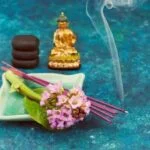Are body essential oils the same as aromatherapy? While they both involve the use of essential oils, there are important distinctions to understand. In this article, we will delve into the world of body essential oils and aromatherapy, exploring their benefits, differences, and how to incorporate them into your daily routine.
Body essential oils have been used for centuries for their therapeutic properties. From promoting relaxation to relieving pain and inflammation, these natural oils offer a wide range of benefits. But how do they differ from aromatherapy, and what makes them unique in their application?
Understanding the science behind the effectiveness of body essential oils is crucial in harnessing their full potential. We will explore the research-backed evidence that supports their use and how they interact with our bodies on a biological level.
Join us as we uncover the intricacies of body essential oils and aromatherapy, shedding light on their potential risks and precautions. Whether you are a seasoned user or new to the world of essential oils, this comprehensive guide will equip you with the knowledge to make informed decisions about incorporating these holistic practices into your daily life.
What Are Body Essential Oils and Their Benefits
Body essential oils are highly concentrated plant extracts that have been used for their therapeutic properties for centuries. These natural oils are extracted from different parts of plants, including the flowers, leaves, stems, and roots, through methods such as distillation or cold pressing.
Some of the most popular body essential oils include lavender, tea tree, peppermint, and eucalyptus. These oils are known for their various benefits, including their ability to promote relaxation, alleviate stress, uplift mood, and even provide relief from minor health issues like headaches and muscle aches.
In addition to their aromatic properties, body essential oils have been found to have antibacterial and anti-inflammatory effects when applied to the skin or inhaled through aromatherapy. The use of these oils can also enhance overall well-being by promoting better sleep quality and reducing symptoms of anxiety and depression.
Many people incorporate body essential oils into their daily routines through methods such as diffusing the oils in a room, applying them topically after dilution with a carrier oil, or adding them to bath water for a relaxing soak.
It is important to note that while body essential oils offer a wide range of benefits, they should be used with caution due to their potency. When using these oils on the skin, it is crucial to dilute them properly to avoid irritation or allergic reactions.
Additionally, certain essential oils can interact with medications or cause adverse effects in individuals with certain health conditions. Consulting a healthcare professional or a qualified aromatherapist is recommended before using body essential oils for therapeutic purposes.
| Body Essential Oils | Benefits |
|---|---|
| Lavender | Promotes relaxation and aids in better sleep quality |
| Peppermint | Alleviates headaches and muscle aches |
| Tea Tree | Has antibacterial and anti-inflammatory properties |
| Eucalyptus | Uplifts mood and relieves respiratory congestion |
How Do Body Essential Oils Differ From Aromatherapy
Understanding Body Essential Oils
Body essential oils are highly concentrated plant extracts that have been used for various health and wellness purposes for centuries. These oils are derived through distillation or cold-pressing processes, capturing the natural essence and aroma of the plant. Body essential oils have been praised for their therapeutic properties, including their ability to promote relaxation, alleviate stress, and even provide relief from certain physical ailments.
Difference From Aromatherapy
While body essential oils are commonly used in aromatherapy, it’s important to note that they are not the same thing. Aromatherapy refers to the practice of using essential oils for therapeutic purposes, often through inhalation or topical application. In contrast, body essential oils specifically refer to the pure extracts themselves and can be used in a variety of ways beyond just aromatherapy.
Benefits of Using Body Essential Oils
In addition to their use in aromatherapy, body essential oils can be beneficial in other applications such as massage therapy, skincare products, and even in homemade cleaning solutions. These oils can also be diluted for safe topical use on the skin or added to bath water for a relaxing soak. The versatility of body essential oils sets them apart from aromatherapy alone, as they offer a wide range of potential benefits when incorporated into daily routines.
The Science Behind the Effectiveness of Body Essential Oils
The Extraction Process
Body essential oils are carefully extracted from different plant parts such as the flowers, leaves, bark, and roots through methods like distillation or cold-pressing. These oils are highly concentrated and contain the natural fragrance and properties of the plants they are derived from. The extraction process is crucial to preserving the potency and effectiveness of these oils.
Chemical Composition
The chemical composition of body essential oils plays a significant role in their effectiveness. These oils contain compounds such as terpenes, alcohols, esters, and ketones, which contribute to their therapeutic properties. For example, lavender essential oil contains linalool and linalyl acetate, known for their calming and relaxing effects. The unique combination of chemicals in each essential oil determines its specific benefits and potential uses for health and wellness.
Absorption Into the Body
When applied to the skin or inhaled, body essential oils can be absorbed into the bloodstream and affect various physiological processes in the body. This absorption allows the volatile compounds in the oils to interact with receptors in the nervous system, leading to soothing or invigorating effects depending on the type of oil used.
The science behind how body essential oils interact with the body’s systems is a fascinating area of study that continues to uncover new insights into their therapeutic potential.
The Benefits and Uses of Aromatherapy
Aromatherapy, also known as essential oil therapy, is the practice of using natural oils extracted from flowers, leaves, stems, roots, or other parts of a plant to enhance psychological and physical well-being. These aromatic essential oils can be used in a variety of ways to promote relaxation, relieve stress, and improve mental clarity. Some common uses and benefits of aromatherapy include:
- Relaxation and stress relief: Certain essential oils such as lavender, chamomile, and bergamot are known for their calming properties and can help reduce anxiety and promote relaxation.
- Improvement of sleep quality: Aromatherapy has been shown to help improve sleep quality by promoting relaxation and reducing insomnia. Essential oils like lavender and cedarwood are often used to create a calming atmosphere conducive to better sleep.
- Mood enhancement: Citrus oils like lemon and orange are known for their uplifting properties and can help improve mood and overall well-being.
In addition to these benefits, aromatherapy can also be used for pain relief, improved digestion, enhanced cognitive function, and even as a natural insect repellent. Whether through inhalation, topical application, or diffusion in the air, the use of essential oils in aromatherapy has been practiced for centuries for its therapeutic effects.
Incorporating aromatherapy into your daily routine can be as simple as adding a few drops of your favorite essential oil to a diffuser or creating a soothing massage oil blend.
It’s important to note that while aromatherapy offers many potential benefits, it is not a substitute for medical treatment. It should be used as a complementary therapy alongside traditional healthcare practices. Always consult with a qualified healthcare professional before using essential oils for any health concerns or conditions.
How to Incorporate Body Essential Oils Into Your Daily Routine
Body essential oils can offer a wide range of benefits that go beyond just smelling nice. When incorporated into your daily routine, these oils can have a positive impact on both your physical and mental well-being. There are several simple and effective ways to make the most out of body essential oils.
One way to incorporate body essential oils into your daily routine is by adding a few drops to your bath. This not only creates a relaxing and luxurious atmosphere but also allows the essential oils to be easily absorbed through the skin. Additionally, you can use a diffuser to fill your living space with the pleasant scent of essential oils, promoting a calm and soothing environment.
Another method is to create DIY body products such as lotions, creams, or massage oils using body essential oils. By doing so, you have the opportunity to tailor these products according to your personal preferences and needs. Furthermore, applying diluted essential oils directly onto pulse points or temples can provide quick relief from stress or headaches throughout the day.
In addition, incorporating body essential oils into your daily skincare routine can offer various skin benefits. For example, tea tree oil is known for its antibacterial properties and is commonly used in skincare products to help treat acne. On the other hand, lavender oil has soothing properties that can benefit those with sensitive or irritated skin.
| Ways to Incorporate Body Essential Oils | Description |
|---|---|
| Add to bath | Allows for relaxation and absorption through the skin |
| Use in a diffuser | Fills space with pleasant scents and promotes calming environment |
| Create DIY body products | Tailor products according to personal preferences and needs |
| Apply onto pulse points or temples | Provides quick relief from stress or headaches throughout the day |
Understanding the Potential Risks and Precautions of Using Body Essential Oils and Aromatherapy
When using body essential oils and aromatherapy, it is important to be aware of the potential risks and take necessary precautions to ensure safe use. Here are some key points to keep in mind:
1. Skin Sensitivity: Some essential oils can cause skin irritation or allergic reactions, especially when applied directly to the skin without being diluted. It is important to perform a patch test before using any new essential oil on your skin. This can help you determine if you have any sensitivity to the oil and prevent any adverse reactions.
2. Ingestion Risks: While some essential oils are safe for ingestion when used properly, others can be toxic if ingested. It is crucial to follow proper guidelines and consult with a healthcare professional before consuming any essential oils internally. Children, pregnant women, and individuals with certain health conditions should be especially cautious about ingesting essential oils.
3. Safety Concerns for Pets: Certain essential oils can be harmful or even toxic to pets when ingested or inhaled. Pet owners should research which essential oils are safe to use around their animals and take necessary precautions to prevent accidental exposure.
It is important to thoroughly research and understand the potential risks associated with using body essential oils and aromatherapy before incorporating them into your daily routine. By following safety guidelines and taking necessary precautions, you can enjoy the benefits of these natural remedies while minimizing the risk of adverse effects on your health and well-being.
Remember that when used responsibly, body essential oils and aromatherapy can enhance overall wellness and provide a wide range of physical and emotional benefits. Always use caution, do your research, seek professional advice if needed, encouraging safety above all else as you explore the world of essential oils and aromatherapy.
Conclusion
In conclusion, it is important to understand that body essential oils and aromatherapy are related but distinct practices. Body essential oils are concentrated extracts from plants that can be used for a variety of physical and mental health benefits, such as reducing inflammation, improving sleep, and boosting mood. Aromatherapy, on the other hand, involves using essential oils for their aromatic properties to promote relaxation, alleviate stress, and enhance overall well-being.
While body essential oils can be used in aromatherapy practices, they are not interchangeable. The key difference lies in the application and purpose of use. Body essential oils are commonly applied topically or ingested for targeted health benefits, while aromatherapy often involves diffusing essential oils into the air or combining them with carrier oils for massage to create a therapeutic environment.
Despite their differences, both body essential oils and aromatherapy have been shown to have potential health benefits when used safely and responsibly. It is important to consult with a qualified healthcare professional or aromatherapist before incorporating body essential oils or aromatherapy into your daily routine, especially if you have any underlying health conditions or concerns about potential risks.
By understanding the science behind their effectiveness and following recommended guidelines, you can make informed choices about how to integrate these practices into your wellness routine for maximum benefit.
Frequently Asked Questions
Can You Use Aromatherapy Essential Oils on Your Body?
Aromatherapy essential oils can definitely be used on the body when diluted properly. Whether it’s through massage, added to bath water, or applied topically, essential oils can provide various benefits for physical and emotional wellness.
Is There a Difference Between Essential Oils and Aromatherapy Oils?
Essential oils and aromatherapy oils are often used interchangeably, but there is a slight difference between the two. Essential oils are pure extracts from plants, while aromatherapy oils are usually a blend of essential oils with other carrier oils or ingredients specifically designed for aromatherapy purposes.
Is Body Oil and Essential Oil the Same Thing?
Body oil and essential oil are not the same thing. Essential oils are highly concentrated plant extracts that need to be diluted before applying to the skin, while body oil is a ready-to-use product that already contains carrier oils and other beneficial ingredients for skin nourishment and hydration.
While both can have similar benefits for the skin, they serve different purposes in terms of application and usage.

Are you looking for a natural way to improve your health and wellbeing?
If so, aromatherapy may be the answer for you.





